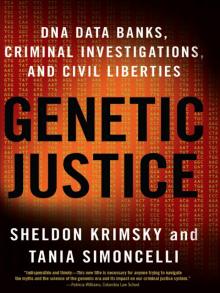Genetic Justice


Author: Sheldon Krimsky
Category: Other3
Published: 2011
Series:
View: 589
Read OnlineNational DNA databanks were initially established to catalogue the identities of violent criminals and sex offenders. However, since the mid-1990s, forensic DNA databanks have in some cases expanded to include people merely arrested, regardless of whether they've been charged or convicted of a crime. The public is largely unaware of these changes and the advances that biotechnology and forensic DNA science have made possible. Yet many citizens are beginning to realize that the unfettered collection of DNA profiles might compromise our basic freedoms and rights.Two leading authors on medical ethics, science policy, and civil liberties take a hard look at how the United States has balanced the use of DNA technology, particularly the use of DNA databanks in criminal justice, with the privacy rights of its citizenry. Krimsky and Simoncelli analyze the constitutional, ethical, and sociopolitical implications of expanded DNA collection in the United States and compare these...
 West of the Quator
West of the Quator The Alignment Ingress
The Alignment Ingress Wicked Lover (Magical Lovers Book 2)
Wicked Lover (Magical Lovers Book 2) The Parihaka Woman
The Parihaka Woman Primal Bargains
Primal Bargains Family Treed
Family Treed Cora Jones and the White Mask (The Cora Jones Series Book 1)
Cora Jones and the White Mask (The Cora Jones Series Book 1) After The Moon Sets (Werewolf Paranormal Romance)
After The Moon Sets (Werewolf Paranormal Romance)